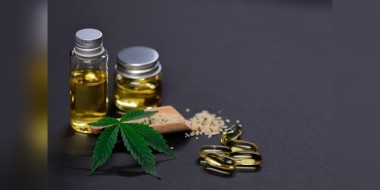New York, NY--The Cannabidiol (CBD) industry has gained massive popularity following its legalization in the U.S. and many other parts of the world. CBD is just one of the many identified cannabinoids found in the cannabis plant. It does not have any tetrahydrocannabinol (THC) — the psychoactive ingredient responsible for producing the "high" feeling while consuming cannabis. On the contrary, CBD is known to have a sedative effect and is touted as a breakthrough for treating several mental and physical conditions.
[Photo by Kindel Media via Pexels]
CBD has made its mark in many countries worldwide, even those that refrain from having a discourse around decriminalization or legalization of cannabis, considering the two are derived from the same plant. The push towards adopting CBD in healthcare has led to several companies producing various products; the craze around, for some businesses, might even seem like a derivative of snake oil.
Many companies in the U.S. and the world are seeing legalization as a window to enter the market and establish themselves as an authoritative brand. The scope for growth is enormous, and the consumers are thirsty for more. Continuous research around CBD and cannabis is only adding to the cause.
Catering to a rising demand
CBD turned out to be a massive hit among consumers post-legalization. The market is thriving. In 2020, CBD sales in the U.S. hit $4.6 billion, only two years after the federal legalization. 2021 was even better for CBD, as it witnessed a 15% growth from 2020 figures, with sales reaching $5.3 billion. And that's only a fragment of what's to come. The same research firm, Brightfield Group, estimates that the CBD market will reach $16 billion by 2026 as more new customers enter the market.
CBD can be consumed in multiple forms, catering to different tastes. The study revealed that drinks and gummies were the most popular products in 2021, showing 71% and 44% value growth, respectively. Online sales are booming too. There's plenty for businesses to look forward to.
Particular interest by millennials is another factor in this market's growth. Market research has pointed out that nearly half of millennials have tried a CBD product, reinstating the demand for CBD and the industry's push for growth.
Pooling information on CBD's effectiveness
All the talk about the many benefits of CBD could not just be in vain. Multiple pieces of research have been conducted in the past few years to determine CBD's effectiveness and how practical it would be to introduce it in mainstream treatment.
"It's promising in a lot of different therapeutic avenues because it's relatively safe," James MacKillop, co-director of McMaster University's Michael G. DeGroote Center for Medicinal Cannabis Research, said in a report.
F.D.A is taking a keen interest in CBD too. The federal body approved Epidiolex in 2018. The purified CBD extract is used to treat severe and rare forms of epilepsy. "This approval serves as a reminder that advancing sound development programs that properly evaluate active ingredients contained in marijuana can lead to important medical therapies. And, the FDA is committed to this kind of careful scientific research and drug development," said then FDA Commissioner Scott Gottlieb, M.D.
However, not all CBD oils would work in the same manner, as much of that data is specific to Epidolex and can't be used for other CBD formulations. Similarly, CBD's role in treating anxiety is also in the gray, as a double-blind study found that it didn't lead to much change in participants' emotional states. "If it's a calming drug, it should change their responses to the stimuli," said Harriet de Wit, co-author of the study published in 2017 and a professor in the University of Chicago's department of psychiatry and behavioral neuroscience. "But it didn't."
But there's little looking back for CBD as an industry. Studies that hint CBD does little to help calm people or aid them with sleep failed to show results not because CBD does not help but because the trials may not have used the right CBD amount, considering the discrepancy around the correct dosage. More rigorous tests need to be done, and more data needs to be collected.
But limited data on CBD may not stop people from trying it for different ailments, which could be a precursor to more data. Besides, FDA's solid stand for sound scientific research before approving a drug might go a long way in inviting companies and research bodies to invest more resources in rigorous research. The more data we have on CBD, the easier it would be to determine its efficacy for various ailments. Until then, many would take it, hoping it could just work for them.
